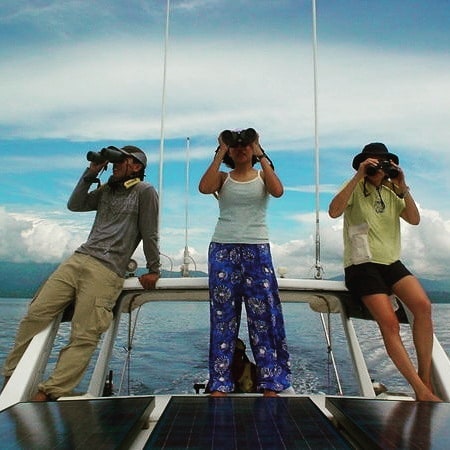A Deep Dive into Marine Biology with Jean Utzurrum
- The ULF Team
- Feb 19, 2021
- 3 min read
Updated: Aug 10, 2022
Writing, doing field work, and sometimes teaching people how to swim—marine biologists do it all. Hear from Jean, one of our most passionate Filipina marine biologists.

Jean at the Visayas SEA camp talking about sharks and showing their published field guide.
Although already well-accomplished in the field of marine biology, Jean would describe her journey in STEM as never-ending. Having completed her bachelor’s and currently undergoing graduate studies, she initially never considered becoming a scientist. For various reasons, Jean felt limited to a life in academia or working for an environmental NGO after completing her bachelor’s degree. In graduate school, she saw a world beyond science where research leads to policies and action. It was then she realized that the sciences are far from fruitless.
While passionate in her pursuit of science, Jean admits to occasionally having to meet halfway between career and practicality. “There have been many times when I’ve had to re-prioritize research goals to favor jobs that pay more. Sometimes when I’m in between jobs I’ll even do some freelance as a swim instructor and writer. It’s during these between days that I’ll find myself reevaluating a career in STEM.” Although surrounded by supportive friends and family who are nothing but encouraging, the reality of having to make a living is something she also considers.
However, Jean has definitely made some notable strides in her field. She found her niche in the study of elasmobranchs, or sharks and rays as known by many. This eventually gave her the opportunity to work with the Silliman University’s Marine Laboratory Museum and their extensive collection of chondrichthyan, or cartilaginous fish, specimens, and become the co-author of the field guide. Recently this year, she was also invited to virtually participate in regional IUCN Red List Assessment Workshops for 126 species of sharks and rays in Southeast Asia.
I’ve been fortunate to have worked with and be mentored by fellow women in STEM throughout my career, and to have lived in a university town like Dumaguete City with world-renowned Filipino women scientists as role models (Dr. Hilconida Calumpong, Dr. Louella Dolar, and my aunt, Dr. Ruth Utzurrum among others).
Jean considers herself lucky because opportunities like these are hard to come by in the sciences. Beyond gender, there are other factors such as lack of opportunities, as mentioned by Jean. “Gender has not been a hindering factor, to say the least. In my case, the lack of long-term employment opportunities in the field of marine biology has been the main factor.” On a more serious note, she does acknowledge the gender gap in STEM. While it might not be as extreme a case here in the Philippines, it is still the reality of today’s time. “Sexism and harassment have not hindered my pursuit of STEM. But it exists. It happens. It can be very tiring, stressful, and traumatizing to deal with.” Nevertheless, she finds hope in initiatives to make safer spaces for women to blossom in the field.
Because of this, she is optimistic about the future of women in the sciences. “Visible, loud, and accepted.” This is how she envisions women in STEM. “You can be anything you work to achieve. It’s okay to have days when you doubt yourself. Don’t be afraid to ask questions —keep being inquisitive and curious!”
Jean Utzurrum is a marine biologist who is finishing her master’s degree in Siliman University where she also completed her undergraduate studies. While she currently works freelance, her previous field research experiences include coral reef restoration, coral reef and mesophotic fishes, and fisheries. She has volunteered with Reef Check Philippines and the World Wildlife Fund and also served as an elasmobranch specialist for the Marine Wildlife Watch of the Philippines.




































Comments